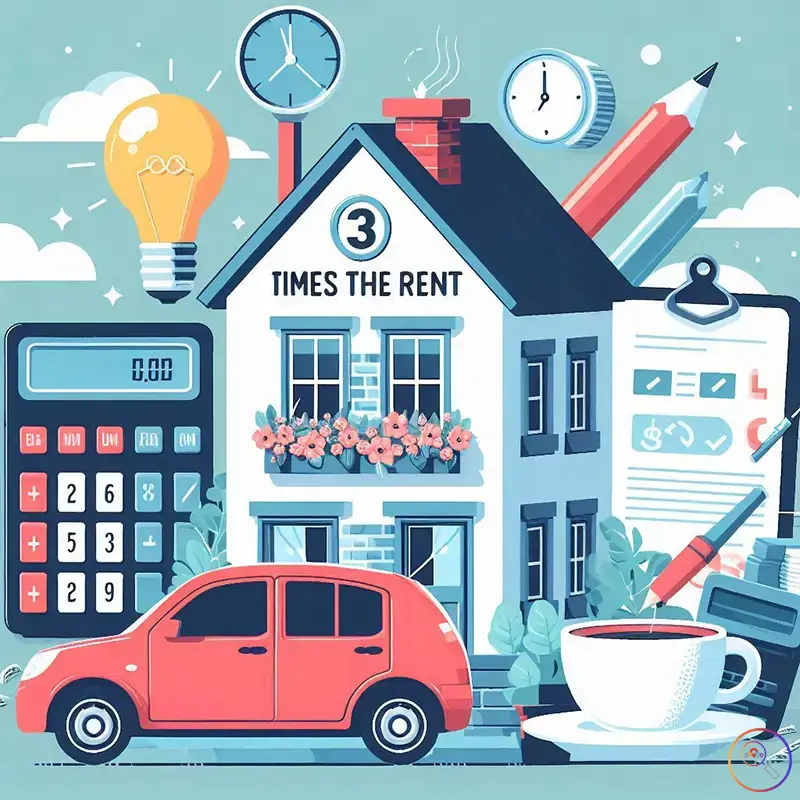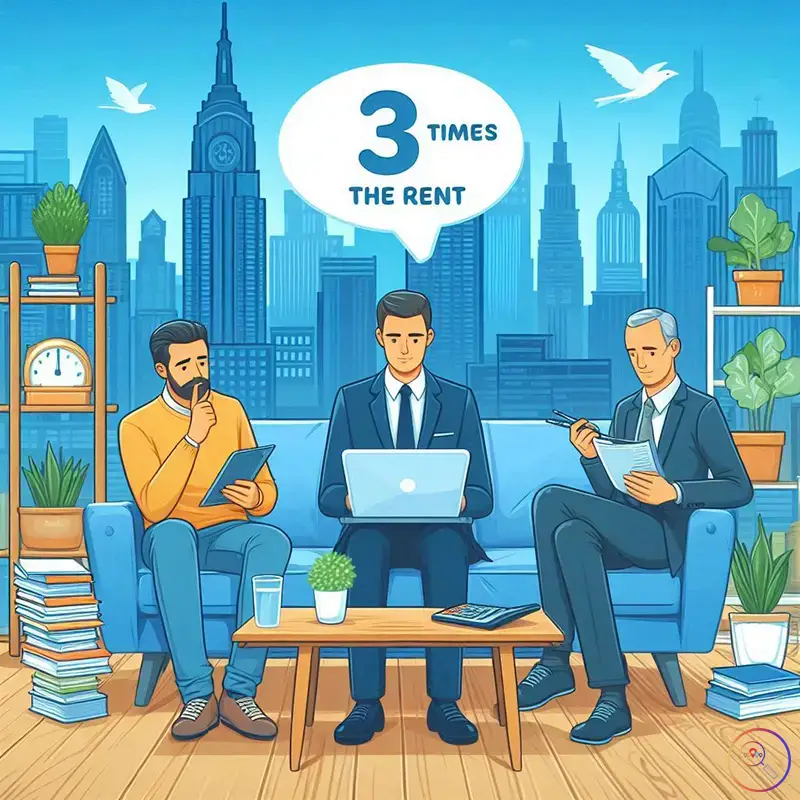“The rule is simple: you need to earn three times your rent. But what does that really mean for renters?”
It’s a phrase almost every renter will come across at some point: “You need to make three times the rent.” Sounds straightforward, right? Well, it can raise a lot of questions. Why three times? What’s the purpose behind this rule? How do you calculate it? And what can you do if you don’t hit that magic number?
Click Here To Use Our 3x Rent Calculator
Whether you’re a first-time renter or an experienced apartment hunter, understanding this common rental requirement can make all the difference in your search. Let’s break down what it really means and how you can navigate it to land your next home.
The Meaning Behind the 3x Rent Rule
When landlords or property managers say you need to make three times the rent, they’re referring to your gross monthly income—meaning the amount you earn before taxes or deductions. Essentially, if an apartment rents for $1,500 a month, they’re expecting you to have a monthly income of at least $4,500.
But why is this figure so important? It’s about risk management. Landlords want to make sure you can comfortably afford rent without putting yourself in a financial bind. For renters, it serves as a financial guideline too—if you’re spending more than a third of your income on rent, you might find yourself stretched thin when it comes to covering other living expenses.
This is especially important if you’re searching in competitive markets, such as high rise apartments in Houston or high rise apartments in Dallas, where rental rates tend to be higher, and income requirements can feel like more of a hurdle.

Why the 3x Rent Rule Exists
Landlords aren’t just being arbitrary when they set this rule. The idea is to ensure that renters have enough cushion in their finances to not only cover rent but also manage other monthly expenses—think utilities, groceries, transportation, and savings. It minimizes the risk of late payments or defaults.
For renters, it may seem like a hurdle. But in many cases, it can be helpful. If you’re spending more than 30% of your income on rent, you might find yourself financially stretched. This guideline is there to help balance the equation between living costs and income. This is particularly relevant when you’re trying to strike a balance between affordability and lifestyle, such as when choosing between cheap apartments in Houston or more luxurious options.
Crunching the Numbers: How to Calculate Your Ideal Rent
How do you figure out if you meet the 3x rent requirement? Here’s the quick math:
Take the monthly rent and multiply it by three. For example, if the apartment you’re eyeing is $2,000 a month:
$2,000 × 3 = $6,000
In this scenario, you would need to earn at least $6,000 in gross income each month to meet the requirement. It’s simple but critical when you’re figuring out which apartments are within your financial reach.
Gross Income vs. Net Income: Which One Matters?
Here’s where things can get a little confusing. The 3x rent rule is almost always based on gross income—that’s the amount of money you earn before taxes and other deductions. Most landlords want to see the big number on your paycheck, not what you actually take home.
However, it’s important to think about your net income when budgeting. After all, your net income—what you bring home after taxes—reflects what you can actually spend. Even if you qualify based on gross income, consider how your take-home pay will impact your ability to cover other expenses like utilities, groceries, and car payments.
Can You Afford $1,500 in Rent?
Let’s put this into perspective. If you’re looking at a rental that costs $1,500 per month, here’s what you’ll need to earn:
$1,500 (rent) × 3 = $4,500 in gross monthly income.
If you’re paid bi-weekly, break it down further:
$4,500 ÷ 2 = $2,250 every two weeks.
This simple calculation gives you a clear target to aim for in terms of income. If you fall short of that number, you might need to consider alternatives, like looking for a lower-cost rental or finding a roommate to split expenses.
What If Your Income Falls Short of 3 Times Rent Rule?
Not hitting the 3x rent mark isn’t the end of the world. Many renters find themselves in this situation, especially in competitive or high-cost markets. Fortunately, there are a few workarounds:
- Co-Signer or Guarantor: A co-signer (typically a parent or relative) can vouch for you and take on financial responsibility if you fall behind on rent. They’ll need to meet the income requirements themselves, often needing to show 3 times (or even 4x) the rent.
- Higher Deposit: Offering a larger security deposit can sometimes reassure landlords that you’re a reliable renter, even if your income doesn’t meet the exact requirement.
- Roommates: Splitting rent with a roommate is another practical solution. The combined income can help meet the 3x rent threshold more easily.
- Negotiation: Depending on the landlord, you might have room to negotiate. Some landlords will accept 2.5x rent or work with you if you have other strengths, like excellent credit or strong rental history.

Adjusting for 2.5x Rent Instead of 3x
Some landlords may accept a lower income threshold, like 2.5 times the rent. While this isn’t as common, it’s definitely worth asking about, especially if you’re close to qualifying.
Here’s how it works: If the rent is $1,500 per month, 2.5 times that rent would be:
$1,500 × 2.5 = $3,750 gross monthly income.
If your income falls in this range, it may open up more possibilities for you in your apartment search.
Proving You Meet the 3 Times Rent Rule
When applying for an apartment, proving that you meet the income requirement is essential. Here are the most common ways to do it:
- Recent Pay Stubs: Landlords usually ask for your most recent 2-3 pay stubs.
- Tax Returns: If you’re self-employed, tax returns may be required.
- Bank Statements: These can be useful for proving additional income sources.
- Offer Letters: If you’ve just started a new job, an offer letter from your employer can help.
Make sure you have these documents on hand when you’re applying—it will streamline the process and make your application stronger.
What If You Can’t Hit 3x Income?
If you can’t quite hit that 3x income threshold, don’t panic. There are several other ways to boost your chances:
- Guarantor: A guarantor (or co-signer) can step in and provide an extra layer of security for landlords.
- References: Strong references from previous landlords can work in your favor.
- Savings: Some landlords will accept proof of savings as a backup for income requirements.
- Downsizing: Consider looking for more affordable rental options if the numbers simply don’t work.
Navigating the 3x Rent Rule: Final Thoughts
The “3 times the rent” rule may seem like a roadblock, but it’s really a way to ensure that both renters and landlords are set up for success. With a bit of planning, creative solutions, and understanding your own financial situation, you can overcome this challenge and find your ideal rental. Whether it’s securing a guarantor, splitting costs with a roommate, or negotiating with landlords, there are always ways to make it work.







